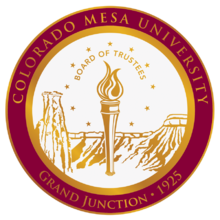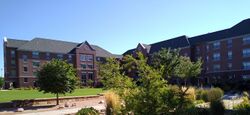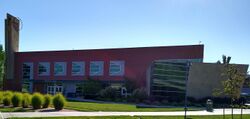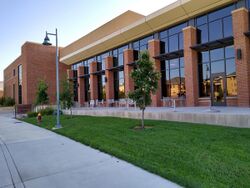Colorado Mesa University
Topic: Organization
 From HandWiki - Reading time: 8 min
From HandWiki - Reading time: 8 min
 | |
Former names | Grand Junction Junior College (1925–1937) Mesa College (1937–1988) Mesa State College (1988–2011)[1] |
|---|---|
| Motto | Empowering the Mind Through Heart |
| Type | Public university |
| Established | 1925 |
Academic affiliations | Space-grant |
| Endowment | $42.19 million (2022)[2] |
| President | John Marshall |
| Students | 9,110[3] |
| Undergraduates | 8,945[3] |
| Postgraduates | 165[3] |
| Location | Grand Junction , Colorado , United States [ ⚑ ] : 39°04′50″N 108°33′16″W / 39.08061°N 108.55456°W |
| Campus | Urban, 104 acres (42 ha) |
| Newspaper | The Criterion |
| |u}}rs | Maroon, white & gold |
| Nickname | Mavericks |
| Website | www |

Colorado Mesa University (CMU or Mesa) is a public university in Grand Junction, Colorado. The university's other locations include the Bishop Campus, which houses Colorado Mesa University Tech in northwestern Grand Junction, and a regional campus in Montrose, approximately 60 miles south of Grand Junction. CMU grants associate degrees, bachelor's degrees, and master's degrees.
Previously Mesa State College, the college attained university status in August 2011 and changed its name to Colorado Mesa University.
Board of trustees
The Board of Trustees has 13 trustees (11 voting and two non-voting). The voting members are appointed by Colorado's governor and confirmed by the Colorado State Senate and serve staggered terms. The Colorado Mesa University Student Trustee is elected by the student-body and is considered one of the most influential positions in the university and college system. The Senatus Academicus names a member from its ranks to serve as the eleventh member.[4]
Academics
Colorado Mesa University offers programs leading to awards in five levels: technical certificates, associate degrees, baccalaureate degrees, master's degrees and professional doctoral degrees. The university is accredited by the Higher Learning Commission.
As of 2023, half the student body were first-generation college students.[5]
Residence life

Colorado Mesa University offers options for students to live on campus. Over 2,000 students live on campus in 11 residential buildings, consisting of traditional rooms, suites and pods, and apartments.
Residence halls and apartments are governed by the Residence Hall Association (RHA). The Residence Hall Council (RHC) is an extension of RHA and acts as the governing body for each residence hall. The RHC of each building is composed of an elected executive board and an RHA representative.
Notable facilities
Houston Hall
Houston Hall has the reputation of being the first building on campus. Built in 1940, it is named for the college's first president, Dr. Clifford G. Houston. Before its construction, the college had occupied an abandoned school building (the old Lowell School) in the city's downtown area. During the 2011 expansion and renovation project, delicate care was taken to match the new wing's ornamental brick facade with that of the original building.

Dominguez Hall
Dominguez Hall was built in 2011 and is home to the Davis School of Business and the Center for Teacher Education. This building has several classrooms, including four large semi-circle lecture rooms, computer labs, small study rooms, study open spaces (indoors and outdoors), faculty offices, a coffee shop, and a boardroom.
Lowell Heiny Hall
Originally built in 1967 to house the college library, previously located in Houston Hall, Lowell Heiny Hall now houses University Authorities offices, Registrar's Office, President's Office, HR, Marketing, and faculty offices.

The University Center
The University Center was built in 2010 to replace the aging W.W. Campbell College Center. It houses the main campus dining facilities, including Dining Hall, Bookcliff Cafe, Starbucks Coffee, and a small convenience store. The center also houses the Associated Student Government, The Criterion campus newspaper, KMSA 91.3FM, Bookstore, Ballroom, student lounges, MAV Card Office, and the Student Life office, which contains some club offices.
The Maverick Center
Formerly known as Saunders Field House, The Maverick Center houses all athletic facilities in one building, except for football and baseball. Facilities include Brownson Arena, El Pomar Natatorium, Hamilton Recreation Center, and Monfort Family Human Performance Lab. Adjacent to The Maverick Center are Walker Field soccer and lacrosse stadium, Elliot Tennis Complex, Bergman Softball Field, and the Maverick Pavilion.
Moss Performing Arts Center
The Moss Performing Arts Center, named for local Colorado Mesa University supporters John and Angie Moss, provides music, dance and theatre students with the facilities needed to let their creativity shine. The center, which recently underwent a $5.1 million renovation and expansion, is home to the 600-seat William S. Robinson Theatre, a 300-seat recital hall, the Walter Walker Reception Area, the Mesa Experimental Theatre, a design studio, numerous music practice rooms, smart technology classrooms, faculty offices and a dance studio.
Moss is the home to the Theatre and Music Departments which offer a variety of entertainment for the campus and local community throughout the year.

Tomlinson Library
By 1984 the library's collection had outgrown Lowell Heiny Library and plans were made to build the collection a new home. The new library was dedicated in 1986. Recognized as an architectural gem in American School and University magazine[citation needed], the library was named for outgoing college president John U. Tomlinson in 1988 to honor his commitment to improved library services at the college. Tomlinson Library contains over 190,000 volumes, including a large government documents collection, and a geology library. It also houses the Ethridge Pottery Collection of prehistoric southwestern ceramics.
Forensic Investigation Research Station
Known by the acronym "FIRS", this facility consisting of a laboratory building and a fenced-in body farm is located just outside Grand Junction.[6] As of January 2018, the decomposition of 11 bodies was under investigation with a focus on identification of microbial clocks, collections of microorganisms that appear and change in a predictable manner during the course of human body decomposition.[6]
Athletics
CMU's athletic teams are known as the Mavericks; their mascot is symbolized by a rearing bull's head with flaring nostrils. Official colors are maroon, white, and gold. Student body fans are known as The Herd.
The Colorado Mesa Mavericks have 28 varsity teams[7] that compete in NCAA Division II athletics, as part of the Rocky Mountain Athletic Conference. CMU fields teams in men's football, men's baseball, men's and women's basketball, women's volleyball, men's and women's cross country, men's and women's indoor and outdoor track and field, men's and women's golf, men's and women's soccer, men's and women's lacrosse, women's softball, men's and women's swimming, men's and women's tennis, and men's and women's wrestling.
Sustainability
Geothermal Energy Program
CMU is one of the first adaptors to utilizing Geothermal energy throughout their campus. The project known as "CMU Geo-Grid" is currently underway.[8] The system heats and cools for 1.2 million square feet of academic and auxiliary buildings, reduced CMU's carbon footprint reduced by 17,742 metric tons of CO2 per year, and provides CMU cost predictability allowing CMU to offer the second lowest tuition rate in Colorado.[8] Currently, CMU Geo-Grid is connected 16 of the campus' buildings.[8] The University is planning to geothermal system to 9 addition buildings.[8] The latest expansion is expected to happen from Colorado General Assembly bill SB23-250, passed by Barbara Kirkmeyer, Kyle Mullica, Marc Catlin, and Shannon Bird, which secured $6 million for further implementation CMU's geothermal exchange system.[9] The bill was signed into law by Governor Jared Polis on April 28, 2023.[10]
In 2021, Western Governors Association launched the Heat Beneath our Feet initiative at CMU's Campus.[8] The initiative purpose is to "examine opportunities for and barriers to the increased deployment of geothermal energy technologies for both electricity generation and heating and cooling systems in western states, which contain the vast majority of high-yield geothermal energy capacity in the U.S."[11]
Compost Program & Facility
CMU's Compost Facility is student-run organization providing education, training, and selling compost to the public.[12] The program takes university generated food-waste and converts it nutrient-rich soil additive, thus, reducing the universities overall waste product.[13] The compost facility is ran by CMU’s Sustainability Council founded the Dr. John Heideman in 2013.[14]
Student media
- KMSA 91.3 FM
- The Criterion, student newspaper
- CMU-TV, student-run television station
- Horizon, student-run magazine
Notable alumni
- Bligh Madris, professional baseball player
- Tony Martin, professional football player
- John Pagano, professional football coach
- Josh Penry, former minority leader of the Colorado State Senate
- Matt Soper, member of the Colorado House of Representatives
- Ben Steele, professional football player and coach
References
- ↑ "A Century of College". Colorado Mesa University. https://www.coloradomesa.edu/now/2022/05/a-century-of-college.html.
- ↑ As of June 30, 2022. Foundation Annual Report 2022 (Report). CMU Foundation. June 30, 2022. https://www.supportingcmu.com/file/FOUN_Annual-Report_2122_web.pdf. Retrieved February 6, 2023.
- ↑ 3.0 3.1 3.2 "College Navigator - Colorado Mesa University". https://nces.ed.gov/collegenavigator/?q=Colorado+Mesa+University&s=all&id=127556.
- ↑ http://new.mesastate.edu/trustees/index.html.mesastate.edu[yes|permanent dead link|dead link}}]. 2010. Board of Trustees. Retrieved 2010.09.14
- ↑ "CMU supporting first-generation students". 2023-03-08. https://www.nbc11news.com/2023/03/03/cmu-supporting-first-generation-students/.
- ↑ 6.0 6.1 Beans, Carolyn (2 January 2018). "Can microbes keep time for forensic investigators?". Proceedings of the National Academy of Sciences of the United States of America 115 (1): 3–6. doi:10.1073/pnas.1718156114. PMID 29295964. Bibcode: 2018PNAS..115....3B.
- ↑ "About Colorado Mesa University". https://www.coloradomesa.edu/about/index.html.
- ↑ 8.0 8.1 8.2 8.3 8.4 "Geo-Grid System | Colorado Mesa University". https://www.coloradomesa.edu/sustainability/initiatives/geo-grid.html.
- ↑ "Funding bill for Colorado Mesa and Western universities advances, Gov. Polis expected to sign" (in en). 2023-04-18. https://www.kjct8.com/2023/04/18/funding-bill-colorado-mesa-western-universities-advances-gov-polis-expected-sign/.
- ↑ Catlin, Marc; Bird, Shannon; Kirkmeyer, Barbara; Mullica, Kyle, Transfer From Severance Tax Operations Cash Fund, https://leg.colorado.gov/bills/sb23-250, retrieved 2024-01-13
- ↑ "The Heat Beneath Our Feet | WGA". https://westgov.org/initiatives/overview/the-heat-beneath-our-feet.
- ↑ "Compost Facility | Colorado Mesa University". https://www.coloradomesa.edu/sustainability/initiatives/compost.html.
- ↑ "Sustainability Council | Colorado Mesa University". https://www.coloradomesa.edu/student-life/clubs-organizations/sustainability-council/index.html.
- ↑ "From kitchen to garden" (in en). https://www.coloradomesa.edu/now/2019/07/from-kitchen-to-garden.html.
External links
 KSF
KSF